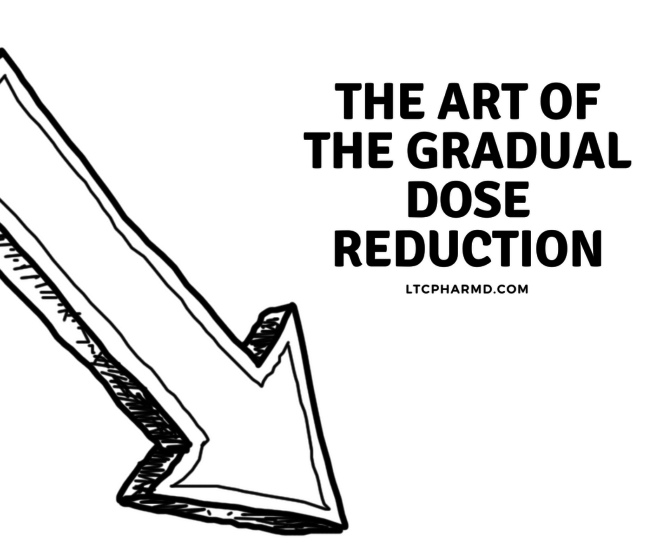Managing Gradual Dose Reduction’s (GDR’s) can be a brutal game. Many clinicians despise the term and hate being asked to address the use of a psychotropic or sleep medication. I can definitely relate, but as a healthcare professional who’s worked in long term care, it is necessary to understand how to best manage a gradual dose reduction. I will outline some tips and strategies to help you assess these medications and stay in compliance of the regulations. I’m going to cover the new 14 day psychotropic PRN deficiency at a later date.
Let’s start with the regulation. Psychotropic medications (basically any medication used for a behavior modification purpose), need to have a gradual dose reduction attempted 2 times within the first year OR the physician needs to document the rationale for continuing that drug and not doing a GDR. After the first year of treatment, or year in the facility on that medication, the requirement drops to annually. This regulation forces action (whether that’s documentation or actual reduction) by the physician, which some may not like or agree with, but it what it is as they say.
Let’s elaborate on the term “psychotropic medication” as there are some nuances here. The easiest way I remember this is to say that it is ANY medication used to modify a behavior or brain function. I’ve got two examples I’ve seen slip through the cracks. Valproic acid can certainly be used for seizures and is sometimes classified as an anticonvulsant agent. A patient who is seizure free, having no side effects with a well established seizure history is not a GDR candidate. However, a patient on valproic acid for aggressive behaviors certainly would fall under this umbrella and GDR’s or physician documentation should be done. Prazosin (an alpha blocker) used for hypertension and BPH would not fall under the GDR category. However, if it was being used for nightmares, it potentially would.
Adjustment period. Unless the drug is causing side effects or has been used for a short period of time (like in the case of acute delirium), reducing the dose of a psych drug within the first couple weeks is usually not an appropriate thing to do. The resident is under tremendous stress due to social changes and admission into a long term care facility.
Past history. Reviewing past medical history is so important in assessment of gradual dose reductions. If you know a resident has had long standing depression throughout their life and has needed medication therapy for it, this is likely a patient where we may document that past history and elect not to do a gradual dose reduction. If you see that a resident has severe mental health disorders that have led to hospitalization or attempted suicide, they are likely not a good candidate for reduction. In cases like these, involving psychiatry can often be helpful.
Assessing why they were started. Psychotropic medications tend to get started at times when there is great life stressors. Anxiety following a move to a different location, depression due to the loss of a loved one, or worsening mood due to the new diagnosis of a terminal condition are all situations I’ve seen contribute to the new onset of psychiatric symptoms. Be sure to assess when and why that drug was started as in these cases, the patient may be able to eventually come to grips with situational changes and hopefully reduce their psychotropic medications.
Physician documentation. Getting detailed enough documentation as to why the psychotropic medication needs to be continued is one of the great challenges in being a consultant pharmacist. In full disclosure, there are some physicians who have wonderful documentation. I suspect there are plenty of directors of nursing who also bang their heads up against the wall sometimes. Responses that will likely get you in trouble or at least get surveyors digging into a resident’s medication further include; “stable”, “no change”, “because I said so”, “the drug works” and so on…
The deficiency given for not documenting or not doing a GDR will be a F758 (Unnecessary psychotropic), and possibly a F756 if the consultant pharmacist did not alert you to the issue. If you’d like to review how often these tags are cited, I’ve broken them down here.
